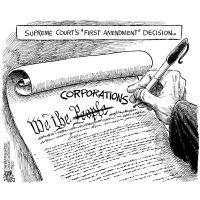5-4 Supreme Court Votes Give 2 more Victories to Corporate Leaders over Employees
 (cartoon: Adam Zygus, Buffalo News)
(cartoon: Adam Zygus, Buffalo News)
Big Business this week won back-to-back rulings before the U.S. Supreme Court in cases involving issues of workplace harassment and retaliation for complaints of discrimination.
One case dealt with Title VII of the 1964 Civil Rights Act (pdf), which stipulates that employers can be liable for discrimination by a supervisor, but not by coworkers.
In Vance v. Ball State University, the plaintiff claimed she was subjected to discrimination by a supervisor—whom she defined as someone who controlled her work schedule and performance evaluations. It is a definition that is used by the Equal Employment Opportunity Commission, as well as several courts.
But the supervisor in question did not possess the power to hire, fire and promote workers—and on that basis, the pro-corporate wing of the Supreme Court rejected (pdf) the plaintiff’s argument because the superior was really a coworker in their view.
Justice Samuel Alito wrote for the majority that non-hierarchical management structures in today’s workplace required a narrow definition of supervisor, implying that everyone could otherwise sue everyone else for every imagined slight.
In the second case, the pro-corporate wing again prevailed, this time in a discrimination case brought against the University of Texas Southwestern Medical Center.
The plaintiff, Dr. Naiel Nassar, resigned after enduring derogatory comments from his supervisor about his race and religion. He later sued, alleging that he was denied a job at the medical center’s sister hospital in retaliation for his previous complaints about discrimination.
After losing the case in lower court, the university medical center appealed, saying Nassar needed to show that the alleged retaliation was the sole factor leading to the job denial.
The Supreme Court sided (pdf) with the defendant’s argument.
Justice Anthony M. Kennedy said victims must prove in retaliation cases that the actions taken against them came only as a result of the employee’s complaint of discrimination and not other reasons.
“Both decisions dilute the strength of Title VII in ways Congress could not have intended,” wrote Justice Ruth Bader Ginsburg in her dissent. She called on Congress to pass legislation that would reverse both rulings.
-Noel Brinkerhoff
To Learn More:
Supreme Court Splits Openly on Worker Protection Suits (by Robert Barnes, Washington Post)
By 5-4, a More Hostile Workplace (by Teresa Tritch, New York Times)
Will The Media Acknowledge U.S. Chamber's Sweep Of Supreme Court's Decisions? (by Lara Schwartz, Media Matters for America)
Vance v. Ball State University (by Jonathan Goddard and Zachary Glantz, Cornell University Law School)
Court Ruling: Vance v. Ball State University et al. (Supreme Court of the United States) (pdf)
Court Ruling: University of Texas Southwestern Medical Center v. Nassar (Supreme Court of the United States) (pdf)
Supreme Court Supports Companies Forcing Arbitration as Alternative to Class Action Suits (by Matt Bewig, AllGov)
Supreme Court is more “Corporative” than Conservative (by Noel Brinkerhoff and David Wallechinsky, AllGov)
- Top Stories
- Unusual News
- Where is the Money Going?
- Controversies
- U.S. and the World
- Appointments and Resignations
- Latest News
- Trump Orders ICE and Border Patrol to Kill More Protestors
- Trump Renames National Football League National Trump League
- Trump to Stop Deportations If…
- Trump Denounces World Series
- What If China Invaded the United States?






Comments